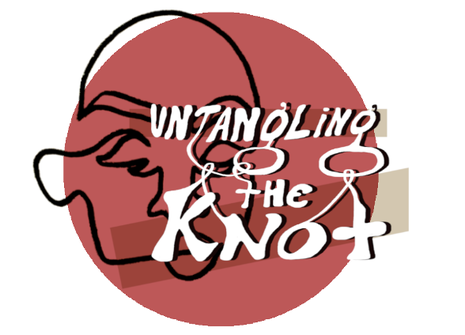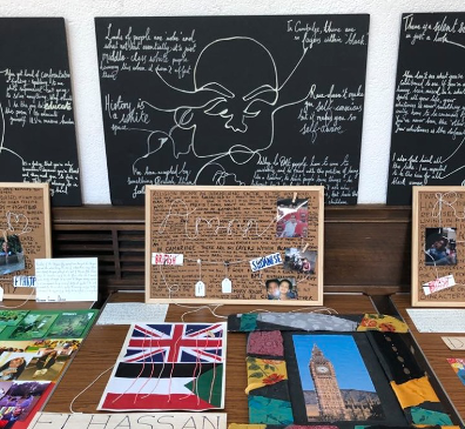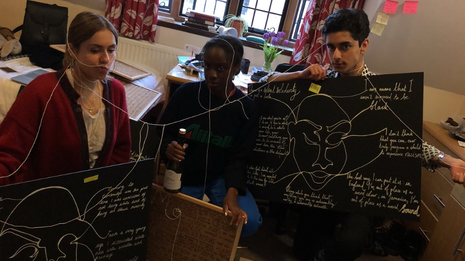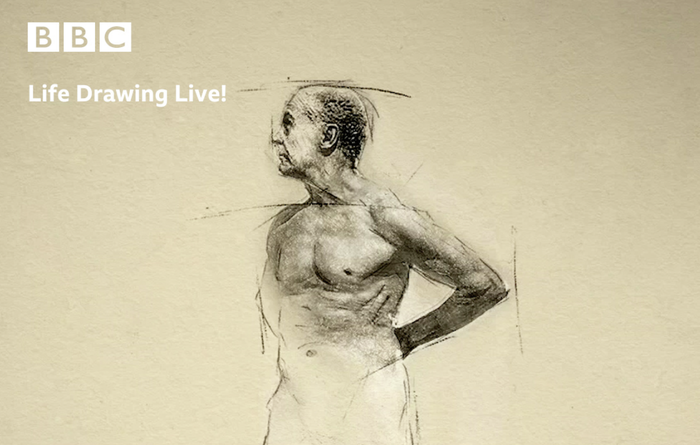Untangling the Knot: “The only way a lot of people are encountering race is through an academic lens”
Charlotte Gamble speaks to Yasmin Kira, founder of Untangling the Knot, about how university students can open up the conversation on race.

At university, conversations about race tend to take place in the confines of a lecture hall, a sociology module or an academic article supported by a hefty set of footnotes. “The only way a lot of people are encountering race at the moment is through an academic lens. You can’t go into a lecture, conducted by a white person, and come out feeling woke,” Yasmin Kira, founder of Untangling the Knot, tells me. “It doesn’t work like that because race is something which is felt by people.
Untangling the Knot brings an unfiltered and personalised exploration of race, immigration and identity to spaces that have traditionally been dominated by white voices. Taking place in the Bridgetower Room of Trinity Hall, the collective’s first exhibition displayed one-on-one conversations with ten Cambridge students from second and third generation BME immigrant backgrounds. Using art and photography, the project subverted the question “Where are you really from?".

“It’s a frustrating question to answer,” Yasmin says. “As a mixed race person who attended a multicultural secondary school, I was never white passing enough to feel British, nor was I culturally Indian or Iranian enough to feel like I belonged to a particular ethnic group. At Cambridge, I realised a lot of people have never had to question their identity in this way or have even spoken to someone who doesn’t see themselves as British because they’ve always occupied fundamentally white spaces.”
Conversations like this are at the core of the project and, as Yasmin tells me, it’s not difficult to find interviewees who are ready to contribute. “Often I’ll message potential interviewees completely out the blue on Facebook. There was also a time where I was in the Cindies smoking area and I started to have a really intense, interesting conversation with a girl about race. We exchanged contact details so that I could set up an interview with her at a later date and she featured in our first exhibition.”
“Untangling the Knot brings an unfiltered and personalised exploration of race, immigration and identity”
Keen to maintain the authentic voice of the interviewee, and the way race is often incoherently experienced by individuals, the interviews are kept to the exact word before they’re posted on social media. “That’s the whole point of these interviews,” Yasmin says. “I don’t want them to produce answers that they’ve thought about carefully, written down and edited. It allows me to really press them in the moment about how they feel - that’s when they formulate the most emotional responses.

"For the first exhibition my friends and I basically had loads of fun blowing money on lots of felt tip pens and chalk in an art shop,” Yasmin says. The artists experimented with line drawing faces and collaging images that were personal to the interviewee. Without losing the handcrafted charm of the first project, Untangling the Knot has worked closely with student illustrator Zoë Matt-Williams to develop a more distinctive style for their project.
With a physical exhibition out of the question during this global pandemic, the project has expanded with their newest interviews, podcast episodes and live discussions being posted on their social media. They have also used their online presence as a forum for debate about how race politics plays into current affairs.
“Our work is doubly important right now,” publicity officer, Eliane Thoma-Stemmet, tells me. “As is becoming increasingly apparent every day, covid-19 is not a ‘great leveller’. The disparity between how the pandemic is affecting individuals from different ethnicities and social backgrounds in the UK is startling. Regularly updating our feed with opinion pieces on these issues, we have been conscious of this in our social media presence since lockdown.”
Moving forward, Untangling the Knot is looking for submissions for their new printed publication that will include articles, poetry and illustrations narrating what it’s like to occupy the “third space”. As was the case with their first interviews, the publication is not “a platform for political rhetoric or engagement on a purely intellectual basis,” Yasmin insists. “We want to hear peoples stories and experiences.”
 Comment / Plastic pubs: the problem with Cambridge alehouses 5 January 2026
Comment / Plastic pubs: the problem with Cambridge alehouses 5 January 2026 News / Cambridge businesses concerned infrastructure delays will hurt growth5 January 2026
News / Cambridge businesses concerned infrastructure delays will hurt growth5 January 2026 News / Cambridge academics stand out in King’s 2026 Honours List2 January 2026
News / Cambridge academics stand out in King’s 2026 Honours List2 January 2026 News / AstraZeneca sues for £32 million over faulty construction at Cambridge Campus31 December 2025
News / AstraZeneca sues for £32 million over faulty construction at Cambridge Campus31 December 2025 Interviews / You don’t need to peak at Cambridge, says Robin Harding31 December 2025
Interviews / You don’t need to peak at Cambridge, says Robin Harding31 December 2025










